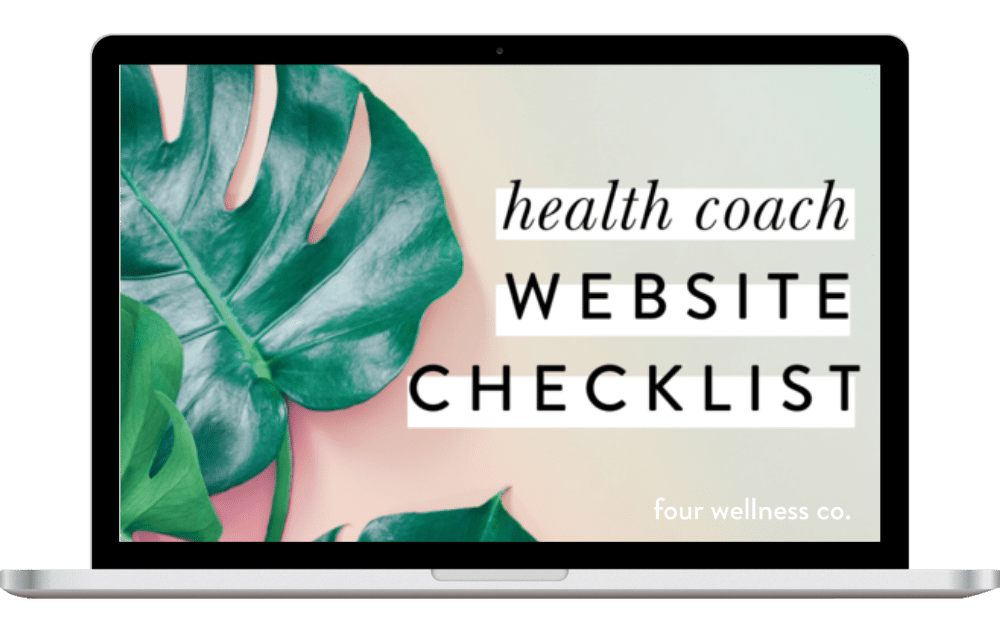Business Mistakes I Made as a Health Coach
This post contains affiliate links, through which we may earn a small commission if you choose to purchase, at no additional cost to you. We only share products or services we personally use & recommend!
I’m a certified integrative nutrition health coach—but I don’t actually practice health coaching anymore.
That’s a long story that has a lot to do with my other hat as a web designer and online business consultant (I help other health coaches and wellness professionals set up and grow your own health coaching businesses).
But it was also influenced, at least in part, by certain business mistakes I made early on in my health coaching career—mistakes that ended up working well for me in the long run as a web designer / business consultant, but that I wouldn’t recommend making if you’d like to stay a health coach. 😉
Health coaching business mistakes (+ lessons learned)
I’ll be the first to say that making mistakes is one of the very best ways of learning what works and what doesn’t. (So, nothing against mistake-making!)
And, what’s more: a lot of entrepreneurial wisdom is very individual-specific. What works well for one person doesn’t always mesh the same for another, or work out the same in a different context, so there is a lot that does have to be learned hands-on.
But, there are some overarching mistakes that are nice to avoid, if you can, to save yourself the time and money!
Here are the health coaching business mistakes (or misdirections) I made & would recommend you avoid:
1. Trying to do it all at once
I started Four Wellness Co. with a super awesome—but way overcomplicated—business model that was unsustainable. It was very comprehensive and lovely, but much better suited to a business in its 10th year with a team of 50 people.
That doesn’t work in Year One, as a team of one!
And trust me, it’s a lot harder to back-pedal on momentum you’ve gained but can’t keep up with than to start out slower and build up at a more sustainable pace.
So, I can’t emphasize enough that, when just starting out, it’s best to keep your health coaching practice as simple as possible, and grow from there with time, as you’re able.
That may mean starting with just 1:1 coaching and adding group coaching or membership programs later on. Or starting with a very specific niche before expanding offerings to be more comprehensive down the road.
In whatever ways this applies to you: simplify, simplify, simplify.
You can always add on later. (Unless you started with too much, and then you actually can’t because there’s no more bandwidth.) Start small, do it well, and grow from there. This also gives you the benefit of time, which you can use to gain insight from your audience and really tailor your wellness business to meet their needs.
Health coaching lesson learned:
Start as simple as possible & grow from there.
2. Not getting niche enough with my health coaching audience
I’ve shared before how important it is to clearly define your target audience for your health coaching practice. But, many health coaches (me included, before!) define their target audience far too broadly.
Especially as you’re just starting out, the more you can niche down and meet a very specific “ideal client,” the easier it will be to find them, sell a health coaching program to them, and serve them well.
Many health coaches worry that defining too specific of a target audience will result in no clients. But with online business (which health coaching is increasingly becoming, especially with COVID-era limitations), specificity is your friend. Casting too wide a net is actually to your detriment because it’s tougher to be found by (and appeal to) your ideal client, whom you can best serve.
I recommend niching down your health coaching audience as specific as you can possibly get. Rather than building your practice around general health coaching, is there a particular area of wellness you have the most expertise or experience in, or that you enjoy the most?
It’s much more effective to find and serve people who have a specific health or wellness concern they’re looking for help with than to try to appeal to everyone who is interested in “healthy living.”
So, do you specialize in something like autoimmune disease, or fertility, or building muscle? Do you work with a specific group, like middle-aged women, or new moms, or a specific cultural group?
These examples aren’t even as specific as you could ultimately get, but you get the point. Narrow down your target audience as much as you possibly can, so you can speak to them more directly, attract more of your “ideal client” to your health coaching practice, and ultimately serve them better because you are a fantastic fit for their needs.
Health coaching lesson learned:
Keep your wellness niche as specific as possible.
3. Not thinking outside the health coaching “schedule”
As a health coach, you have a finite amount of time with which to provide your direct coaching services. (And, with something as energy-intensive as 1:1 health coaching, that finite amount of time is typically closer to 4-ish hours a day than the typical 8-hour workday.)
When you run out of time, you run out of ways to grow your health coaching business, audience, or income. It’s a bit limiting in that regard, and can also be exhausting. Eventually you feel like you’re on a hamster wheel trying to keep up with all of your clients. Maxing out is actually no fun!
In the long-run, I absolutely recommend building passive income streams into your business. Things like self-paced online courses, resource libraries, or other types of membership communities relevant to your health coaching audience.
This doesn’t mean 1:1 health coaching isn’t a worthy option anymore. It totally is!
But I think it’s wise to set yourself up for supplemental passive income options down the road too. That diversifies your health coaching income streams, increases your income potential as a health coach, and gives you the most business sustainability over time.
Just a reminder that lesson #1 here is all about not trying to do too much at once. You definitely don’t have to wait to launch your health coaching practice until you have an entire online membership program or fitness video archive built. But, it’s a good idea to keep your eventual “outside the schedule” health coaching options in mind, and to begin building a prospective audience for them, which we’ll talk about next.
Health coaching lesson learned:
Plan for passive income products too.
4. Not prioritizing email list-building for my health coaching business
When I first started Four Wellness Co., I had some email opt-in boxes on my website. But they were more of the icing on the cake rather than the entire cake.
And, when you’re just starting an online business, particularly one with high-value offerings like health coaching, the email opt-ins really are the entire cake.
When is the last time you happened upon someone’s website and immediately purchased a $2,000 health coaching package from them?
Likely never. 🙃
You’re much better suited to draw people in with your publicly available free content (i.e. wellness blog posts), through which you offer a higher value content upgrade (i.e. “lead magnet” or “freebie” opt-in gift) in exchange for their email address. Then, you send these interested subscribers regular emails of value (wellness tips, new healthy recipes, workout of the week, etc.) and build rapport with them over time.
Then, much further down the road, your paid health coaching products are offered. By that time, you’ve put in the work of building rapport with your prospective client, showing them your personality and wellness expertise, and they’re more inclined to trust and purchase a health coaching program from you.
So, back when starting my own health coaching business, I did not immediately prioritize my email list, and instead had to scramble to get it going later on. I definitely recommend you start building an email list of interested potential health coaching clients right away!
We’ve got a bunch more resources and tips on email list-building for health coaches, but it essentially means:
Create an awesome opt-in gift (or two!) directly related to your health coaching services
Have plenty of opt-in opportunities on your health coaching website (with your helpful resource from #1 as an incentive)
Connect your website’s opt-in forms to your mailing list (we use and recommend Flodesk)
Set up a warm welcome automation to welcome new subscribers to your list
Create a branded wellness newsletter template and send regular helpful emails of value
Health coaching lesson learned:
Prioritize email list-building with quality opt-in gifts.
Business tips for health coaches
Each of the “health coaching business” lessons above taught me something valuable that ended up growing both my original wellness company, as well as a different type of business altogether—business tips + resources for other health coaches!
But, I share my newbie health coach mistakes (and the lessons those taught me) here in case they can help you avoid the same detours as you start and grow your own successful health coaching practice. 😇
Perfect your health coaching website
Grab my free checklist for optimizing your wellness website!
It’s got all the big picture must-haves (& all the important little details!) to make your health coach website shine. ✨













